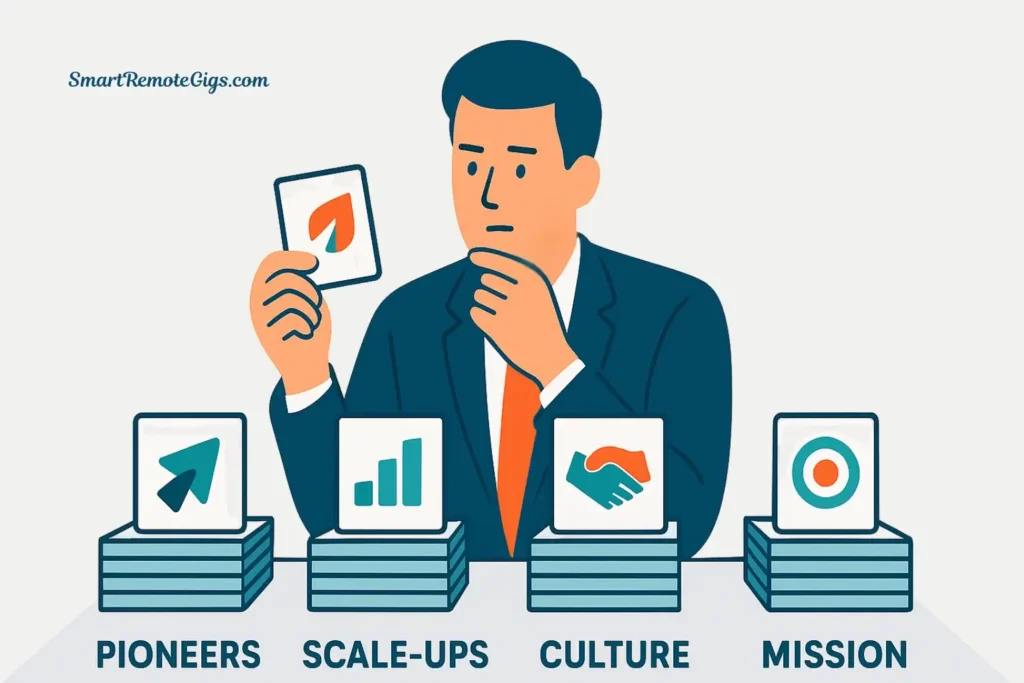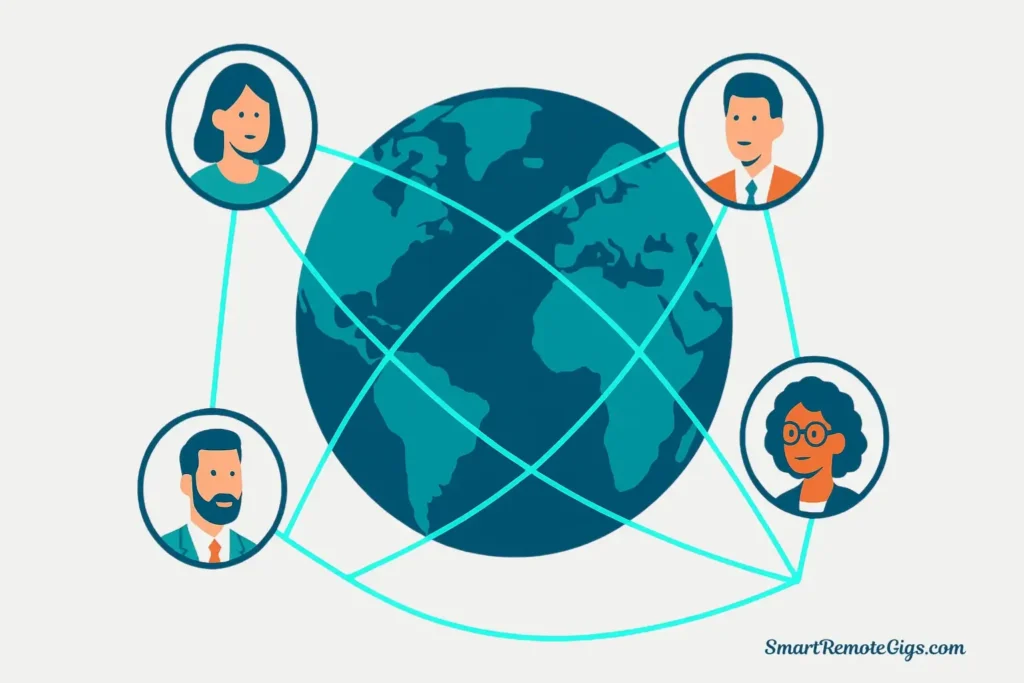If you’ve spent hours scrolling through job boards, clicking on “remote” positions only to discover they actually mean “remote within commuting distance of our headquarters,” you know the frustration. Not all remote opportunities are created equal. Some companies are merely “remote-friendly”—they’ll tolerate you working from home occasionally, but their culture, processes, and expectations remain firmly rooted in office-centric thinking.
Then there are the fully-remote or remote-first companies. These organizations have built their entire operations around distributed teams. They’ve refined their communication protocols, invested in collaboration infrastructure, and created cultures where remote employees aren’t second-class citizens—they’re the entire workforce. For project managers seeking legitimate remote opportunities, these distinctions matter enormously.
This curated list focuses exclusively on companies that are genuinely committed to remote work. Every organization featured here operates with distributed teams as their default mode, not an accommodation. They’ve solved the challenges of asynchronous communication, built trust-based management systems, and created pathways for remote employees to advance their careers.
Whether you’re an experienced PM looking to escape the commute or someone breaking into the field, these 20 companies represent some of the best companies hiring remote project managers in 2025.
The Top 20 at a Glance
Before diving into the detailed profiles, here’s a quick-reference table to help you identify companies that align with your priorities:
| Company | What Makes Them Special | Best For… |
|---|---|---|
| GitLab | Radical transparency & 2,000+ page public handbook | PMs who love documentation & async work |
| Zapier | Location-independent pay & 800 employees in 38 countries | PMs who value fair compensation & automation |
| Automattic | Paid trial projects before hiring | PMs who want to “try before they buy” |
| Doist | 40 days PTO & async-first since 2010 | PMs seeking deep work without meeting overload |
| Shopify | Digital-by-default with massive scale | PMs ready for high-impact work at enterprise level |
| Buffer | Four-day workweek & radical transparency | PMs prioritizing exceptional work-life balance |
| Remote | Mission-aligned (enabling global remote work) | PMs passionate about expanding remote opportunities |
| Toptal | Elite talent network (top 3% of freelancers) | PMs who want to work with exceptional professionals |
| InVision | Design-focused collaboration culture | PMs with strong visual thinking & design appreciation |
| Help Scout | 100% remote since 2011 with “default to transparency” | PMs who value open communication & customer focus |
| Basecamp | Remote work pioneers (20+ years distributed) | PMs who appreciate calm, intentional work cultures |
| Toggl | Paid week-long trial period for candidates | PMs who want to test-drive the role before committing |
| DuckDuckGo | Privacy-first mission & location-independent salaries | PMs passionate about privacy & ethical tech |
| Aha! | Profitable, sustainable growth (no VC pressure) | PMs seeking stability over hyper-growth chaos |
| Hotjar | 30+ countries with “default to async” philosophy | PMs who thrive in truly global, async environments |
| Loom | Video-first communication reducing meeting load | PMs who embrace async video over synchronous calls |
| Notion | All-in-one workspace (dogfooding their own product) | PMs who love comprehensive documentation tools |
| Sketch | Design-forward culture & thoughtful processes | PMs who appreciate elegant, well-designed systems |
| Webflow | No-code platform empowering diverse perspectives | PMs passionate about democratizing technology |
| Close | Fast-paced with excellent written communication culture | PMs who thrive in high-velocity environments |
How to use this table: Scan the “Best For…” column to quickly identify 3-5 companies that match your work style and values. Then dive into their detailed profiles below to learn more about culture, benefits, and hiring processes.
Expert Curation: Companies by Category

To help you navigate these opportunities strategically, we’ve organized the 20 companies into four thematic categories based on their stage, culture, and what they offer project managers:
The Pioneers (Remote Work Trailblazers)
Companies that have operated remotely for 10+ years and literally wrote the playbook for distributed teams: GitLab, Automattic, Basecamp, Doist, Help Scout
Best for: PMs who want to learn from organizations that have solved every remote work challenge imaginable. These companies have battle-tested processes and deep institutional knowledge about what works.
The Scale-Ups (High-Growth Powerhouses)
Organizations experiencing rapid growth while maintaining remote-first cultures: Shopify, Notion, Webflow, Loom, Toptal
Best for: PMs who thrive in fast-paced environments with significant career advancement opportunities. Expect high impact, complex challenges, and the chance to shape processes at scale.
The Culture Champions (Work-Life Integration Leaders)
Companies distinguished by exceptional benefits, sustainable work practices, and employee-centric policies: Buffer, Toggl, Hotjar, Aha!, Close
Best for: PMs prioritizing work-life balance, sustainable pace, and cultures that genuinely care about employee wellbeing. These organizations prove profitability and humanity aren’t mutually exclusive.
The Mission-Driven (Purpose-First Organizations)
Companies where the work directly advances a meaningful mission beyond profit: Remote, DuckDuckGo, InVision, Sketch, Zapier
Best for: PMs who want their daily work to contribute to something larger—whether that’s expanding remote work opportunities, protecting privacy, democratizing design, or eliminating repetitive tasks through automation.
How We Chose These Companies
Building this list required more than simply filtering job boards for “remote” tags. We evaluated companies across several critical dimensions that directly impact your experience as a remote project manager:
Remote-First Culture: Every company included has operated remotely for years, not just since the pandemic. They’ve demonstrated long-term commitment to distributed work through their policies, documentation, and employee testimonials.
Track Record: We prioritized organizations with proven histories of successful remote operations. Companies that have navigated the challenges of building cohesive distributed teams, maintaining productivity across time zones, and fostering genuine connection without physical offices.
Benefits & Compensation: Remote work shouldn’t mean sacrificing quality benefits. The companies featured offer competitive compensation, comprehensive health coverage, professional development budgets, and generous time-off policies. Many provide location-independent salaries rather than adjusting pay based on where you live.
Growth Opportunities: We focused on organizations where project managers can build meaningful careers, not just land jobs. This means companies with clear advancement paths, mentorship programs, and cultures that invest in employee development.
Transparent Hiring Processes: Companies that respect candidates enough to clearly communicate their recruitment stages, timeline expectations, and evaluation criteria made the cut. You deserve to know what you’re walking into.
Active PM Hiring: While these companies hire for various roles, we verified that they regularly recruit for project management positions—whether titled Project Manager, Program Manager, Technical PM, or similar variations.
The result is a targeted list of organizations where you can confidently invest your job search energy, knowing they understand how to support remote project managers effectively.
The Top 20 Remote-First Companies for Project Managers
1. GitLab
GitLab stands as one of the most influential pioneers in the remote-first movement. This AI-powered DevOps platform has operated as a fully distributed company since its founding, currently employing over 2,000 team members across 65+ countries.
What sets GitLab apart is their radical transparency. Their company handbook—publicly accessible and containing over 2,000 pages—documents everything from compensation formulas to communication protocols. For project managers, this means joining an organization where processes are already thoroughly documented, expectations are crystal clear, and you’re empowered to work asynchronously.
GitLab project managers typically work on initiatives related to product development, engineering operations, and cross-functional collaboration. The company offers flexible PTO (up to 25 days at a time), growth and development budgets, and comprehensive parental leave. Their commitment to remote work isn’t performative—it’s foundational to their identity.
Culture highlight: GitLab’s “handbook-first” documentation approach means you’ll spend less time in synchronous meetings and more time executing on clearly defined objectives.
2. Zapier
Zapier has been remote since day one in 2011, long before distributed work became mainstream. With approximately 800 employees across 38 countries, they’ve built their entire workflow automation platform while proving that remote teams can scale effectively.
The company actively hires project managers for various teams, including Product, Engineering, and Operations. Project managers at Zapier coordinate cross-functional initiatives, manage product launches, and ensure smooth execution across distributed teams spanning multiple time zones.
Benefits include flexible time-off policies, annual company retreats to extraordinary locations, retirement plans with employer matching, and a “no question” home office budget. Zapier’s compensation philosophy emphasizes location-independent pay—they pay for the role, not your zip code.
Culture highlight: Zapier practices what they preach, using their own automation tools extensively to eliminate repetitive work and empower teams to focus on high-impact activities.
3. Automattic
As the company behind WordPress.com, Tumblr, WooCommerce, and Jetpack, Automattic operates one of the largest and most established remote workforces in tech. With approximately 2,000 employees distributed across 90 countries, they’ve mastered the art of building culture at scale without physical offices.
Automattic regularly hires project managers to coordinate product development, manage partnerships, and drive strategic initiatives across their diverse product portfolio. Their hiring process is notably unique—after initial interviews, candidates complete paid trial projects that simulate real work, ensuring mutual fit before commitment.
The benefits package is exceptional: minimum 25 days of paid time off annually, life insurance, professional development budgets, open vacation policy, and the flexibility to work from anywhere with reliable internet. Automattic also provides a home office setup budget and co-working space allowances.
Culture highlight: Automattic’s “trial project” approach to hiring eliminates the guesswork—you’ll know exactly what the work feels like before accepting an offer.
4. Doist
Doist has championed asynchronous remote work since 2010, creating productivity tools like Todoist and Twist specifically designed for distributed teams. With employees across 35+ countries, they’ve built their company culture around the principle that meaningful work doesn’t require real-time collaboration.
Project managers at Doist coordinate product development cycles, manage cross-functional initiatives, and ensure alignment across time zones without relying on constant meetings. This async-first approach creates space for deep work and respects team members’ schedules regardless of location.
Benefits include an exceptional 40 days of paid time off annually, educational budgets for professional growth, fully-paid company retreats, and comprehensive health coverage. Doist also provides home office equipment and actively encourages work-life balance.
Culture highlight: Doist’s commitment to asynchronous communication means fewer meetings, more documentation, and the freedom to work during your most productive hours.
5. Shopify
While Shopify maintains some physical office locations, they’ve evolved into a “digital by default” company, making remote work the primary mode of operation. With thousands of employees worldwide, Shopify provides the infrastructure and resources to support distributed teams at massive scale.
The company regularly hires project managers across Product, Engineering, Operations, and various business functions. Shopify PMs manage complex initiatives, coordinate launches, and drive strategic programs that impact millions of merchants using the platform.
Compensation is competitive and location-flexible for most roles, with comprehensive benefits including health coverage, learning budgets, equity opportunities, and generous parental leave policies. Shopify invests heavily in tools, training, and resources to ensure remote employees thrive.
Culture highlight: Shopify’s merchant-first philosophy extends to how they treat employees—providing the tools, autonomy, and support necessary to do exceptional work from anywhere.
6. Buffer
Buffer’s 75+ team members span more than 15 countries, making them a compact but highly effective remote-first organization. Known for radical transparency (they publicly share employee salaries and company revenue), Buffer has built a culture around trust and openness.
The company hires project managers to coordinate marketing initiatives, product development, and customer success programs. Buffer’s four-day workweek policy means you’ll have Fridays off to recharge—a rare benefit that demonstrates their commitment to sustainable work practices.
Additional benefits include at least three weeks of PTO annually, profit sharing, home office budgets, and an annual retreat. Buffer also provides free books (plus a Kindle) and encourages continuous learning. Their Open blog shares detailed insights into how they operate, giving candidates unprecedented visibility into the company culture.
Culture highlight: Buffer’s four-day workweek isn’t a gimmick—it’s a core value reflecting their belief that sustainable work leads to better outcomes.
7. Remote
True to its name, Remote is an HR technology company that helps organizations hire, manage, and pay international employees—and they practice what they enable. With hundreds of employees across 75+ nationalities, they’ve built sophisticated systems for supporting truly global teams.
Remote actively hires project managers for various departments including Product, Engineering, and Operations. PMs at Remote coordinate complex initiatives involving compliance, payroll, benefits administration, and international expansion—meaningful work that directly enables remote work opportunities for others.
Benefits include a minimum of four weeks personal time off, company stock options, comprehensive health coverage, and home office stipends. Remote provides detailed interview guides publicly, demonstrating respect for candidates’ time and helping them prepare effectively.
Culture highlight: Working at Remote means your daily work directly contributes to expanding remote work opportunities globally—mission and execution perfectly aligned.
8. Toptal
Toptal operates a premium freelance network connecting top talent with leading companies. Their permanent team (separate from their freelance network) is entirely distributed, with employees across the globe supporting the platform’s operations.
The company hires project managers to coordinate client engagements, manage internal operations, and drive platform improvements. Given Toptal’s focus on elite talent, they maintain high standards for hiring while offering competitive compensation and flexible work arrangements.
Benefits vary by location due to Toptal’s global footprint, but generally include flexible scheduling, professional development opportunities, and comprehensive health coverage. The company provides tools and resources necessary for effective remote collaboration.
Culture highlight: Toptal’s network consists of the top 3% of freelance talent globally—working here means coordinating with exceptional professionals while enjoying the stability of full-time employment.
9. InVision
InVision, the digital product design platform, has embraced remote work as a core operating principle. With hundreds of employees distributed globally, they’ve built their culture around asynchronous communication and outcome-focused management.
Project managers at InVision coordinate product development, manage customer success initiatives, and drive cross-functional programs across Design, Engineering, and Business teams. The role involves balancing multiple stakeholders across time zones while maintaining momentum on strategic initiatives.
Benefits include competitive compensation, comprehensive health coverage, unlimited PTO policies, home office budgets, and equity opportunities. InVision invests in tools and training to ensure remote teams collaborate effectively despite physical distance.
Culture highlight: As a company building design collaboration tools, InVision deeply understands the importance of clear communication and visual thinking—skills they cultivate in their team culture.
10. Help Scout

Help Scout provides customer service software while operating as a 100% remote company since 2011. With employees across multiple countries, they’ve demonstrated that distributed teams can deliver exceptional customer experiences while maintaining high employee satisfaction.
The company hires project managers to coordinate product development, manage operational initiatives, and drive improvements across their customer support platform. Help Scout PMs work closely with Product, Engineering, and Customer Success teams to deliver value to their customers.
Benefits include flexible work schedules, comprehensive health coverage, generous PTO policies, 401(k) matching, and professional development budgets. Help Scout also hosts annual company retreats and provides stipends for home office equipment.
Culture highlight: Help Scout’s “default to transparency” approach means information flows freely, reducing the communication friction that often plagues remote organizations.
11. Basecamp
Basecamp pioneered remote work in tech, operating as a distributed company for over 20 years. The creators of the project management software bearing their name, they’ve built both products and culture around the needs of remote teams.
While Basecamp maintains a relatively small team (around 60 employees), they hire project managers when scaling specific initiatives or entering new product areas. Their hiring philosophy emphasizes quality over quantity—they’d rather take longer to find the right person than compromise on fit.
Benefits include a four-day workweek during summer months, one-month sabbaticals every three years, comprehensive health coverage, and generous profit-sharing. Basecamp also provides fully-paid company trips and home office budgets.
Culture highlight: Basecamp’s founders literally wrote the book on remote work (it’s called “Remote: Office Not Required”)—they’ve thought deeply about what makes distributed teams effective.
Explore Basecamp Opportunities
12. Toggl
Toggl creates time tracking and project planning tools used by teams worldwide. Operating as a fully remote company with employees across 43 countries in 16 time zones, they’ve built sophisticated asynchronous work practices by necessity.
The company hires project managers to coordinate product development, manage internal operations, and drive strategic initiatives. Toggl’s hiring process is distinctive—after interviews, candidates are “hired” for a paid week-long trial period, allowing both sides to assess fit before committing long-term.
Benefits include flexible PTO, paid sabbaticals, comprehensive health coverage, retirement plans, and home office setup budgets. Toggl also organizes regular company retreats and provides learning and development stipends.
Culture highlight: Toggl’s week-long paid trial eliminates hiring uncertainty—you’ll experience the actual work environment before making a commitment.
13. DuckDuckGo
DuckDuckGo’s mission to protect internet privacy extends to how they treat employees. With 290+ team members across 15 countries, they’ve built a remote-first culture that values autonomy, transparency, and impact.
Project managers at DuckDuckGo coordinate initiatives across Product, Engineering, and Operations teams. The role involves managing complex technical projects, facilitating cross-functional collaboration, and driving strategic programs that advance their privacy-focused mission.
Benefits include location-independent salaries (they pay for the role, not your location), $1,250 annual professional development budgets, comprehensive health coverage, and office setup reimbursement. DuckDuckGo also provides detailed documentation about their hiring process, showing respect for candidates’ time.
Culture highlight: DuckDuckGo’s commitment to privacy and transparency isn’t just marketing—it shapes how they communicate internally and treat employee information.
14. Aha!
Aha! builds roadmapping and product development software while operating as a profitable, fully-remote company. With employees across North America, they’ve demonstrated that remote work enables sustainable growth without venture capital pressure.
The company regularly hires project managers and program managers to coordinate product development, manage customer success initiatives, and drive operational excellence. Aha! emphasizes responsive work—being available during core business hours while maintaining flexibility.
Benefits include comprehensive health coverage, generous PTO policies, retirement plans, and professional development budgets. Aha!’s focus on profitability over growth-at-all-costs creates a more stable work environment than venture-backed startups.
Culture highlight: Aha! practices “responsive” rather than “always-on” work—they expect availability during business hours but respect boundaries and personal time.
15. Hotjar
Hotjar provides website analytics and feedback tools while operating as a completely remote company. With team members across 30+ countries, they’ve built sophisticated processes for coordinating work across time zones and cultures.
Project managers at Hotjar coordinate product development, manage go-to-market initiatives, and drive improvements across their analytics platform. The role involves balancing technical complexity with customer needs while collaborating with distributed teams.
Benefits include flexible work hours, comprehensive health coverage, generous vacation policies, home office budgets, and regular company retreats. Hotjar also invests in learning and development, providing budgets for courses, books, and conferences.
Culture highlight: Hotjar’s “default to async” communication style reduces meeting overload and creates space for deep, focused work.
16. Loom
Loom creates video messaging tools that eliminate unnecessary meetings—and they practice what they build. Operating as a remote-first company, they’ve embraced asynchronous video communication as a core work practice.
The company hires project managers to coordinate product development, manage operations, and drive strategic initiatives across their growing platform. Loom PMs use the company’s own video messaging tools extensively, modeling effective async communication.
Benefits include comprehensive health coverage, unlimited PTO, home office stipends, learning and development budgets, and equity opportunities. Loom also organizes regular offsites and provides resources for maintaining work-life balance.
Culture highlight: Loom’s video-first communication approach means fewer synchronous meetings and better documentation—they’ve reimagined how remote teams share information.
17. Notion
Notion’s all-in-one workspace tool has become essential for remote teams worldwide—and the company itself operates with distributed teams across multiple continents. While they maintain some office spaces, remote work is fully supported and encouraged.
Project managers at Notion coordinate complex product initiatives, manage launches, and drive strategic programs across Product, Engineering, and Business teams. The role involves managing ambiguity, coordinating across functions, and delivering outcomes in a fast-paced environment.
Benefits include competitive compensation, comprehensive health coverage, unlimited PTO, learning budgets, and equity opportunities. Notion provides stipends for home office equipment and co-working spaces.
Culture highlight: Working at Notion means using their product daily for project management, documentation, and collaboration—dogfooding at its finest.
18. Sketch
Sketch, the digital design platform, operates as a fully remote company with team members across Europe and the United States. Their focus on design excellence extends to how they’ve designed their own remote work culture.
The company hires project managers to coordinate product development, manage partnerships, and drive operational improvements. Sketch PMs work closely with Design, Engineering, and Marketing teams to deliver elegant solutions to customer needs.
Benefits include competitive salaries, flexible work arrangements, comprehensive health coverage, generous PTO policies, and learning budgets. Sketch provides home office equipment and supports professional development.
Culture highlight: Sketch’s design-forward thinking influences their approach to remote work—they’ve thoughtfully crafted processes that feel elegant rather than bureaucratic.
19. Webflow
Webflow’s no-code website builder empowers designers to create professional sites without coding. The company operates with distributed teams while maintaining some office locations for those who prefer in-person collaboration.
Project managers at Webflow coordinate product initiatives, manage launches, and drive cross-functional programs across their growing platform. The role involves balancing competing priorities, managing stakeholder expectations, and delivering outcomes in a dynamic environment.
Benefits include competitive compensation, comprehensive health coverage, unlimited PTO, equity opportunities, and professional development budgets. Webflow provides home office stipends and supports flexible work arrangements.
Culture highlight: Webflow’s mission to democratize web design reflects in their culture—they value diverse perspectives and empower team members to make meaningful contributions.
20. Close
Close builds sales engagement software while operating as a fully remote company since its founding. With team members distributed globally, they’ve built processes specifically optimized for asynchronous work across time zones.
The company hires project managers to coordinate product development, manage operational initiatives, and drive improvements across their CRM platform. Close PMs work in a fast-paced environment, balancing multiple stakeholders while maintaining velocity.
Benefits include competitive salaries, flexible work arrangements, comprehensive health coverage, generous PTO policies, and home office budgets. Close also organizes company retreats and invests in team building despite physical distance.
Culture highlight: Close’s focus on written communication creates excellent documentation and reduces dependency on synchronous meetings—essential for effective remote collaboration.
Pro Tip: How to Stand Out When Applying to These Companies

Landing a position at a top remote-first company requires more than submitting a generic resume. These organizations receive hundreds of applications for each opening—you need to differentiate yourself strategically. Here’s how to position yourself as the candidate they can’t ignore:
Demonstrate Remote Work Competencies: Even if you haven’t worked remotely before, you can showcase relevant skills. Highlight experiences where you managed projects across locations, coordinated with distributed stakeholders, communicated complex ideas in writing, or worked independently with minimal oversight. These companies aren’t just hiring project managers—they’re hiring remote project managers who thrive in distributed environments.
Research Their Culture Deeply: Many of these companies share extensive information about their values, working styles, and philosophies. GitLab’s handbook, Buffer’s Open blog, and Doist’s blog provide insider perspectives on how they operate. Reference specific aspects of their culture in your cover letter that genuinely resonate with you. Generic enthusiasm doesn’t stand out—specific alignment does.
Optimize for ATS Systems: Most of these companies use Applicant Tracking Systems that scan for keywords before human eyes see your application. Study the job description carefully and naturally incorporate relevant terms—Agile methodologies, specific tools mentioned, soft skills emphasized—throughout your resume. But don’t keyword stuff; maintain readability for the humans who eventually review your materials.
Showcase Async Communication Skills: Your written application is your first demonstration of how you communicate remotely. Write a clear, concise, well-structured cover letter that anticipates questions and provides context. Think of it as documentation rather than casual correspondence. Remote-first companies value people who can communicate complex ideas in writing without requiring multiple clarification rounds.
Quantify Your Impact: Rather than listing responsibilities, showcase measurable outcomes. “Managed projects” is vague; “Delivered 12 product launches on schedule, reducing time-to-market by 30% through improved sprint planning” is compelling. Remote companies especially value self-starters who drive results—quantification provides evidence of your impact.
Prepare for Skills Assessments: Many companies on this list include practical exercises in their hiring process—case studies, project plans, or trial projects. Treat these seriously. They’re not just testing your technical abilities; they’re evaluating how you approach problems, communicate your thinking, and deliver work in a remote context. Ask clarifying questions, document your assumptions, and present your work professionally.
Network Strategically: While these companies list openings publicly, employee referrals carry significant weight. Engage with their content on LinkedIn, participate in relevant communities, and connect with current employees. Don’t ask for referrals immediately—instead, build genuine relationships by contributing value first. When the time comes to apply, these connections can provide context about your candidacy that applications alone can’t convey.
Show You’ve Used Their Products: If applying to companies like Zapier, Notion, or Loom, mention how you’ve used their tools in previous roles. Product familiarity demonstrates genuine interest and reduces onboarding time. Even better, share specific ways you’ve leveraged their platforms to solve problems—this shows both product knowledge and creative problem-solving.
For detailed guidance on crafting application materials that pass automated screening and impress hiring managers, check our guides on creating an ATS-Optimized Remote PM Resume and writing The Perfect PM Cover Letter.
Conclusion: Your Shortcut to Remote PM Opportunities
Finding legitimate remote project management positions requires more than scrolling job boards and hoping for the best. The companies featured here represent organizations that have genuinely embraced distributed work—not as a temporary accommodation but as a fundamental operating principle.
These 20 fully remote tech companies have invested in infrastructure, refined processes, and cultivated cultures specifically designed to help remote project managers thrive. They understand that successful distributed teams require intentional communication, robust documentation, and trust-based management. When you join one of these organizations, you’re not fighting against an office-centric culture—you’re working within systems built to support your success.
Start by bookmarking the careers pages that align with your experience level and interests. Set up job alerts for project management roles at these companies. Follow them on LinkedIn to stay informed about their growth, values, and openings. When you see positions that match your skills, apply with intention—customizing your materials to demonstrate both your PM competencies and your remote work capabilities.
Remember: landing a remote project management role isn’t just about finding any remote job. It’s about finding the right remote job at an organization that understands how to support distributed teams effectively. The companies on this list have proven track records of doing exactly that.
Your remote project management career doesn’t have to start with uncertainty and compromise. These organizations offer genuine opportunities to build meaningful careers while working from anywhere. The question isn’t whether these opportunities exist—clearly, they do. The question is which one you’ll pursue first.
Ready to take the next step? Choose three companies from this list that resonate most strongly with your values and career goals. Visit their careers pages today. Your remote PM role is waiting—and now you know exactly where to find it.
Top Remote-First Companies for Project Managers in 2025
GitLab
A pioneer in the remote-first movement, this AI-powered DevOps platform operates a fully distributed company with radical transparency and a public handbook.
Their 'handbook-first' documentation approach means you'll spend less time in synchronous meetings and more time executing on clearly defined objectives.
Editor's Rating:
Price: Free
Visit WebsiteZapier
A workflow automation platform that has been remote since day one, known for its location-independent pay philosophy and excellent benefits.
Zapier practices what they preach, using their own automation tools extensively to eliminate repetitive work and empower teams to focus on high-impact activities.
Editor's Rating:
Price: Free
Visit WebsiteAutomattic
The company behind WordPress.com and Tumblr, featuring a unique hiring process that includes paid trial projects to ensure a mutual fit.
Automattic's 'trial project' approach to hiring eliminates the guesswork—you'll know exactly what the work feels like before accepting an offer.
Editor's Rating:
Price: Free
Visit WebsiteDoist
The creators of Todoist and Twist, Doist champions asynchronous remote work with an exceptional 40 days of paid time off annually.
Doist's commitment to asynchronous communication means fewer meetings, more documentation, and the freedom to work during your most productive hours.
Editor's Rating:
Price: Free
Visit WebsiteShopify
A 'digital by default' e-commerce giant that provides the infrastructure and resources to support distributed teams at a massive scale.
Shopify's merchant-first philosophy extends to how they treat employees—providing the tools, autonomy, and support necessary to do exceptional work from anywhere.
Editor's Rating:
Price: Free
Visit WebsiteBuffer
A remote-first social media tool known for radical transparency (public salaries) and an excellent four-day workweek policy.
Buffer's four-day workweek isn't a gimmick—it's a core value reflecting their belief that sustainable work leads to better outcomes.
Editor's Rating:
Price: Free
Visit WebsiteRemote
An HR tech company that helps organizations hire globally, with a mission-aligned culture focused on expanding remote work opportunities.
Working at Remote means your daily work directly contributes to expanding remote work opportunities globally—mission and execution are perfectly aligned.
Editor's Rating:
Price: Free
Visit WebsiteToptal
A premium freelance network with a fully distributed permanent team, offering the chance to work with the top 3% of global talent.
Working at Toptal means coordinating with exceptional professionals while enjoying the stability of full-time employment.
Editor's Rating:
Price: Free
Visit WebsiteInVision
A digital product design platform with a globally distributed team that has embraced asynchronous communication and outcome-focused management.
As a company building design collaboration tools, InVision deeply understands the importance of clear communication and visual thinking.
Editor's Rating:
Price: Free
Visit WebsiteHelp Scout
A 100% remote customer service software company since 2011, known for its 'default to transparency' approach to internal communication.
Help Scout's 'default to transparency' approach means information flows freely, reducing the communication friction that often plagues remote organizations.
Editor's Rating:
Price: Free
Visit WebsiteBasecamp
A true pioneer of remote work for over 20 years, offering unique benefits like a four-day summer workweek and one-month sabbaticals.
Basecamp's founders literally wrote the book on remote work—they've thought deeply about what makes distributed teams effective.
Editor's Rating:
Price: Free
Visit WebsiteToggl
A fully remote time tracking company with a distinctive hiring process that includes a paid week-long trial to ensure a perfect fit.
Toggl's week-long paid trial eliminates hiring uncertainty—you'll experience the actual work environment before making a commitment.
Editor's Rating:
Price: Free
Visit WebsiteDuckDuckGo
A privacy-focused tech company with a remote-first culture that values autonomy, transparency, and location-independent salaries.
DuckDuckGo's commitment to privacy and transparency isn't just marketing—it shapes how they communicate internally and treat employee information.
Editor's Rating:
Price: Free
Visit WebsiteAha!
A profitable, fully-remote software company with a 'responsive' work culture that respects boundaries and offers stability without VC pressure.
Aha! practices 'responsive' rather than 'always-on' work—they expect availability during business hours but respect boundaries and personal time.
Editor's Rating:
Price: Free
Visit WebsiteHotjar
A website analytics company operating remotely across 30+ countries, with a 'default to async' communication style that reduces meeting overload.
Hotjar's 'default to async' communication style reduces meeting overload and creates space for deep, focused work.
Editor's Rating:
Price: Free
Visit WebsiteLoom
A video messaging tool company that practices what it builds, using a remote-first, video-first communication approach to reduce synchronous meetings.
Loom's video-first communication approach means fewer synchronous meetings and better documentation—they've reimagined how remote teams share information.
Editor's Rating:
Price: Free
Visit WebsiteNotion
The all-in-one workspace tool with a distributed team, offering a culture of 'dogfooding' where employees use the product daily to collaborate.
Working at Notion means using their product daily for project management, documentation, and collaboration—dogfooding at its finest.
Editor's Rating:
Price: Free
Visit WebsiteSketch
A fully remote digital design platform with a design-forward culture that thoughtfully crafts elegant processes for remote work.
Sketch's design-forward thinking influences their approach to remote work—they've thoughtfully crafted processes that feel elegant rather than bureaucratic.
Editor's Rating:
Price: Free
Visit WebsiteWebflow
A no-code website builder with a mission to democratize web design, reflected in a culture that empowers diverse perspectives.
Webflow's mission to democratize web design reflects in their culture—they value diverse perspectives and empower team members to make meaningful contributions.
Editor's Rating:
Price: Free
Visit WebsiteClose
A fully remote sales engagement software company with a focus on excellent written communication and processes optimized for async work.
Close's focus on written communication creates excellent documentation and reduces dependency on synchronous meetings—essential for effective remote collaboration.
Editor's Rating:
Price: Free
Visit Website






